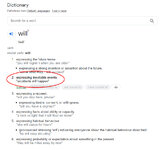A person who hold a gun to my head and tells me to give him my money is not controlling my free will. I can still choose to not cooperate. All he is doing is providing a motivational effect. He is not FORCING the outcome.
The guy with the gun is forcing you to make a moral choice: "Is it better to die than to hand him my money?" Most people would give him their money because that is a better moral outcome than someone dying.
However, in the scenario where the universe is rewound and the outcome must turn out the same, that is indeed robbing us of our free will, because we are not able to do anything differently, or think anything differently.
And why would you want to do anything differently than what you yourself deliberately chose to do?
Determinism is you deciding for yourself what you will do. Determinism is also the guy with the gun forcing you to do what you don't want. Either way, the sequence of events will be deterministic, one thing causing the next, ad infinitum.
I can see why the guy with the gun would bother you. But determinism is not a guy with a gun. Most of the time, determinism is just you deciding for yourself what you will do.
How am I freely deciding what to do if it MUST be a particular outcome? At best, I only THINK I am deciding for myself.
The hard determinist has it backwards. The true illusion is the belief that reliable cause and effect is some king of boogeyman that robs us of our control and our freedom. Actually, that's more like a "delusion".
And it is a pretty perverse view of causation. Every freedom we have, to do anything at all, is
enabled by reliable cause and effect. Reliable cause and effect is essentially the source of all our freedoms. It gives us the freedom to reliably cause the effects we want, like cooking breakfast.
But here is the rub: On the one hand, we are the prior causes of all of our deliberate acts. On the other hand, we ourselves are the reliable result of prior causes.
But being the result of prior causes does not mean that those causes can bypass us or cause us to do things without our knowledge and consent.
The only way that our prior causes can control our decisions is by first becoming an integral part of who and what we are right now. And, once they are us, then it remains the case that we are the true causes of our deliberate actions.
So, the notion that determinism changes anything is a delusion. And it is a delusion that is promoted and propagandized by the hard determinists.
You seem incapable of understanding my position, even though I have explained it in simple terms several times.
I understand your position. I simply disagree with it. And I'm explaining specifically how that position is incorrect.
What I am saying is that there are some things in the universe which are inherently unpredictable, and they render the future unpredictable. And even if we were to rewind the universe to some earlier point in time and let it play out again, the end result could be different.
As you may guess, my position is that the end result could be different, but that it would not be different.
It is this unpredictability that gives us free will, because that unpredictability means that things are not set in stone until they actually happen. The outcome is not fixed.
Free will only comes up when we are unable to predict in advance what we will choose to do. We don't know yet what we will order for dinner. We cannot predict the end result of our own choosing until we have finished choosing. That's the first time we will know for certain what we will order for dinner.
Determinism does not give anyone prescience. The "theoretical predictability" it assumes is not any kind of "practical predictability". So, for all practical purposes, determinism is pretty much useless.
Outcomes are not "fixed in advance". And they are certainly not "set in stone". I will entertain those metaphors with DBT because he seems to embrace them. But apparently you do not.
Causal necessity is simply the natural order of events, where prior events bring about current events, and current events bring about future events. We are events. A human life is a large event, made up of tons of small events. Events within our own minds can cause events in the reality outside our minds.
So, causal necessity is not an external force acting upon us. It is just as much
us as it is anything else.
I have no doubt that you will ignore this as you have the last several times I tried to lay out my position, and you will just continue arguing with me.
That criticism is totally unfair. I have responded respectfully to the ideas you have presented. When I believe your position is in error, I go to great lengths to explain why I think they are incorrect. And I try to take into account that you are not responsible for your errors, because they are errors that have been simply handed down to you through the history of philosophy, particularly surrounding the issues of determinism and free will. My position of these issues is not what you're used to. I disagree with many of the traditional definitions of determinism and most of the implications that others have falsely attached to it. But, that's my problem, not yours.
Feel free to ignore my insights if you cannot digest them. But I will continue to offer them because I believe they are important to our understanding of these issues.



